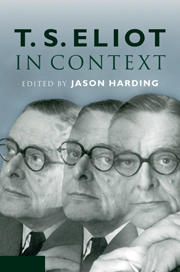Book contents
- Frontmatter
- Contents
- List of illustrations
- List of contributors
- Acknowledgements
- List of abbreviations
- Introduction
- PART ONE LIFE
- PART TWO FORMS
- PART THREE LITERARY CROSS-CURRENTS
- 16 Allusion: the case of Shakespeare
- 17 Classics
- 18 Dante
- 19 Seventeenth-century literature
- 20 Romantic and Victorian poetry
- 21 French poetry
- 22 Georgian poetry
- 23 Bloomsbury
- 24 Ezra Pound
- 25 The avant-garde
- PART FOUR POLITICS, SOCIETY AND CULTURE
- PART FIVE RECEPTION
- Further reading
- Index
22 - Georgian poetry
Published online by Cambridge University Press: 05 August 2012
- Frontmatter
- Contents
- List of illustrations
- List of contributors
- Acknowledgements
- List of abbreviations
- Introduction
- PART ONE LIFE
- PART TWO FORMS
- PART THREE LITERARY CROSS-CURRENTS
- 16 Allusion: the case of Shakespeare
- 17 Classics
- 18 Dante
- 19 Seventeenth-century literature
- 20 Romantic and Victorian poetry
- 21 French poetry
- 22 Georgian poetry
- 23 Bloomsbury
- 24 Ezra Pound
- 25 The avant-garde
- PART FOUR POLITICS, SOCIETY AND CULTURE
- PART FIVE RECEPTION
- Further reading
- Index
Summary
Eliot's reviews of his contemporaries and rivals, the Georgian poets, look like a thorough hatchet job. Written between 1917 and 1922 as Eliot began to establish his place in the London literary world, they leave the reader in little doubt that modern English poetry is morally, poetically and culturally bankrupt. According to Eliot, the Georgians are sentimentalists who substitute ‘Georgian emotions for human ones’. They produce ‘a style quite remote from life’. With their complete ignorance of foreign poetry, their verse is technically complacent and morally lightweight. It offers no real culture to its smug middle-class readership, only decoration of what its audience are already proud of feeling. Contented in their own littleness and humility, the emotional self-satisfaction of the Georgians is the correlative of both a provincial insularity and an aversion to taking risks of any sort.
Unfortunately, if one turns the pages of the later Georgian anthologies, Eliot's verdict seems depressingly just. The first of the five volumes of Georgian Poetry had created a stir when it appeared in 1912, because it allowed readers to sample work from younger poets with a new ethos of uninhibited writing, and – by the standards of the time – direct emotions in plain language. D. H. Lawrence summed up the aims of the contributors – who included Rupert Brooke, W. H. Davies and Walter de la Mare – as a fearless ‘exultation in the vast freedom’ from restrictive nineteenth-century ideals of verse writing.
- Type
- Chapter
- Information
- T. S. Eliot in Context , pp. 221 - 230Publisher: Cambridge University PressPrint publication year: 2011
- 1
- Cited by

